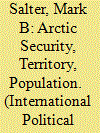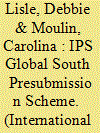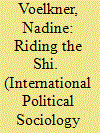|
|
|
Sort Order |
|
|
|
Items / Page
|
|
|
|
|
|
|
| Srl | Item |
| 1 |
ID:
169946


|
|
|
|
|
| Summary/Abstract |
Canada's policies to assert and maintain sovereignty over the High Arctic illuminate both the analytical leverage and blind spots of Foucault's influential Security, Territory, Population (2007) schema for understanding modern governmentality. Governmental logics of security, sovereignty, and biopolitics are contemporaneous and concomitant. The Arctic case demonstrates clearly that the Canadian state messily uses whatever governmental tools are in its grasp to manage the Inuit and claim territorial sovereignty over the High North. But, the case of Canadian High Arctic policies also illustrates the limitations of Foucault's schema. First, the Security, Territory, Population framework has no theorization of the international. In this article I show the simultaneous implementation of Canadian security-, territorial-, and population-oriented policies over the High Arctic. Next, I present the international catalysts that prompt and condition these polices and their specifically settler-colonial tenor. Finally, in line with the Foucauldian imperative to support the “resurrection of subjugated knowledges” (Foucault 2003, 7), I conclude by offering some of the Inuit ways of resisting and reshaping these policies, proving how the Inuit shaped Canadian Arctic sovereignty as much as Canadian Arctic sovereignty policies shaped the Inuit.
|
|
|
|
|
|
|
|
|
|
|
|
|
|
|
|
| 2 |
ID:
169950


|
|
|
|
|
| Summary/Abstract |
Soldiers are rarely imagined as having disabilities, other than when they are injured in war. Yet in recent years the Israeli military has devoted considerable resources to programs promoting the inclusion of soldiers with intellectual disabilities. This paper critically examines two such programs, arguing that they should prompt a reexamination of assumptions in both critical military studies and critical disability studies. These two fields are rarely placed in dialogue, especially in international relations. Yet this paper argues that they have productive insights to offer each other and suggests that the Israeli case raises important questions when their analytical frames are combined. First, the paper argues that this example complicates the category of soldier fitness in critical military studies and reveals that militarist distinctions between ability and disability can be destabilized in ways suggested elsewhere by critical disability studies. Second, however, the paper cautions that the emancipatory potential of alternative “crip” subjectivities explored in critical disability studies remains circumscribed by geopolitical processes (including neoliberalism, settler colonialism, and militarism), which international relations is well placed to analyze. These arguments are advanced by showing how these inclusionary programs for soldiers with disabilities are implicated in the debilitating violence of Israel's settler colonial project.
|
|
|
|
|
|
|
|
|
|
|
|
|
|
|
|
| 3 |
ID:
169951


|
|
|
|
|
| Summary/Abstract |
The fight against terrorism has undergone major changes over the past thirty years. These changes have often been interpreted as a manifestation of “exceptionalism,” a trend that should be criticized for undermining the rule of law. We agree with this diagnosis but want to take a further step by acknowledging that this critical relationship to developments in counterterrorism is an integral part of the social processes to be studied. To this end, our approach places knowledge production at the heart of the scientific study of the fight against terrorism. We aim to understand how the so-called enemy criminal law—a legal dogmatic undertaking that has been used in various settings to reflect on the issue of counterterrorism—has gradually evolved from an objectivist analysis to a critical resource, without its axiomatics having fundamentally changed. With the help of what, in France, is called the “sociologie des épreuves,” we show that this transformation has been achieved through the confrontation of the doctrine with different sociopolitical contexts. We aim to document and help explain this unique trajectory from a sociology of knowledge perspective.
|
|
|
|
|
|
|
|
|
|
|
|
|
|
|
|
| 4 |
ID:
169945


|
|
|
|
|
| Summary/Abstract |
M. grew up in Gambia. Married at twelve, to a man she did not know, she soon became pregnant and gave birth to a baby girl. She raised her, under abusive conditions. By the time her daughter turned eleven, M. knew her child would face the same fate of a forced marriage in Gambia. She decided to flee. She applied for asylum and managed to get protection in Brazil. Living in difficult conditions, learning a language and a set of social expectations in a country ravaged by racial and gender discriminations, M. endured for the sake of her own freedom and that of her daughter.
|
|
|
|
|
|
|
|
|
|
|
|
|
|
|
|
| 5 |
ID:
169949


|
|
|
|
|
| Summary/Abstract |
Social media is becoming a key medium through which we communicate with each other: it is at the center of the very structures of our daily interactions. Yet this infiltration is not unique to interpersonal relations. Political leaders, governments, and states operate within this social media environment, wherein they continually address crises and institute damage control through platforms such as Twitter. A question arises here as to what the turn to Twitter means for conventional structures of power and different levels of communication. This article analyses the emotional dynamics of Twitter, illustrating how emotion is implicated in the power of this social media platform. I argue that Twitter can both represent emotions and provoke emotions, which can play an important role in the escalation or de-escalation of conflict. The emotional conditions Twitter facilitates are implicated in how shifts in temporality and functionality of communication have shaped political discourse so significantly.
|
|
|
|
|
|
|
|
|
|
|
|
|
|
|
|
| 6 |
ID:
169948


|
|
|
|
|
| Summary/Abstract |
This paper focuses on the financialization of refugee humanitarianism in Greece, bringing attention to the Cash Assistance Programme, which is the first European Union–funded project in Europe providing financial support to asylum seekers, coordinated by the United Nations High Commissioner for Refugees. This program consists of the delivery and monthly recharge of prepaid debit cards to asylum seekers inside hotspots and refugee camps. The article deals with three aspects. First, it analyzes the political technologies of government that this system enforces, bringing attention to the modes for governing refugee populations in transit. Second, it considers the data circulation activities that are connected to it, analyzing what I call the circuits of financial humanitarianism and explaining in detail how data is shared between the different actors involved (banks, IGOs, Greek authorities, and NGOs). Third, it explores the specific effects of subjectivation produced by this temporary and exclusionary mechanism of financial support, together with the forms of value extraction that stem from it. The paper argues that far from generating financial inclusion, techniques of financialization of humanitarianism should be situated among measures for regaining control over unruly movements, predicated upon exclusionary and temporary mechanisms of government.
|
|
|
|
|
|
|
|
|
|
|
|
|
|
|
|
| 7 |
ID:
169947


|
|
|
|
|
| Summary/Abstract |
How can a microbial approach to global health security protect life? Contemporary infection control mechanisms set the human and the pathogenic microbe against each other, as the victim versus the menace. This biomedical polarization persistently runs through the contemporary dominant mode of thinking about public health and infectious disease governance. Taking its cue from the currently accepted germ theory of disease, such mechanisms render a global city like Hong Kong not only pervasively “on alert” and under threat of unpredictable and pathogenic viruses and other microbes, it also gives rise to a hygiene and antimicrobial politics that is never entirely able to control pathogenic circulation. The article draws on recent advances in medical microbiology, which depart from germ theory, to invoke an ecological understanding of the human-microbe relation. Here, while a small number of viruses are pathogenic, the majority are benign; some are even essential to human life. Disease is not just the outcome of a pathogenic microbe infecting a human host but emerges from socioeconomic relations, which exacerbate human-animal-microbial interactions. In a final step, the article draws on Daoist thought to reflect on the ways that such a microbial understanding translates into life and city dwelling.
|
|
|
|
|
|
|
|
|
|
|
|
|
|
|
|
|
|
|
|
|